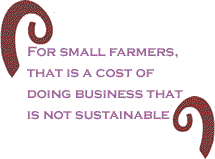|
The
United Nations last month said that, if women farmers were
given the right stuff, there would be from 100 million to
150 million fewer hungry people throughout the world.
 Josette
Sheeran, executive director of the UN�s World Food Programme,
headquartered in Rome,
urged that women (who raise most of the food for human consumption
across the globe) need the right tools and seed to improve
nutrition for millions of rural peoples. The �right tools�
include fertilizer, pesticides, herbicides, and the like. Josette
Sheeran, executive director of the UN�s World Food Programme,
headquartered in Rome,
urged that women (who raise most of the food for human consumption
across the globe) need the right tools and seed to improve
nutrition for millions of rural peoples. The �right tools�
include fertilizer, pesticides, herbicides, and the like.
This
month, the UN�s Commission on the Status of Women will meet
in Rome, right after that body�s meeting of its Committee
on World Food Security. As the earth�s climate continues
to change at a fast pace, the production of enough food
for everyone has been in the news and on the minds of those
who think about those problems.
Decades
ago, when news agencies reported on what was then commonly
called the Third World, the presence of hungry people was
very evident and there was an effort to determine what was
causing hunger and starvation. This was particularly true
in cities like Calcutta,
India, but it was happening in other countries
on most of the continents.
One
of the things they discovered was that one of the prime
causes of hunger was poverty. People did not have enough
money to buy food. Of course, it was more complicated than
that, but poverty was right up at the top of the list as
a cause and, a few generations later, it seems that not
much progress has been made. People are hungry in ever-greater
numbers in most countries, including the U.S.
Since
direct food aid is difficult to send across the world and
make certain that it gets to the people who need it, and
not find it for sale in the local market, those who are
in the business of alleviating hunger and starvation have
turned increasingly to making it easier for people to feed
themselves. That is, making it easier and more productive
to farm on a small scale.
For
example, there is a UN organization called AGRA
(the Alliance for a Green Revolution
in Africa), headed by Kofi Annan, which �supports the use
of science and technology�to aid Africa�s
smallholder farmers in their urgent efforts to end widespread
poverty and hunger.�  The
former secretary-general of the United Nations is chairman
of the board of directors. There are several board members
who came to AGRA by way of the Bill and Melinda Gates Foundation, which has allied
itself with Monsanto, the St. Louis-based chemical and seed
company that is registering patents on as much crop seed
and, even, livestock as is possible, in the U.S. and in other countries. The
former secretary-general of the United Nations is chairman
of the board of directors. There are several board members
who came to AGRA by way of the Bill and Melinda Gates Foundation, which has allied
itself with Monsanto, the St. Louis-based chemical and seed
company that is registering patents on as much crop seed
and, even, livestock as is possible, in the U.S. and in other countries.
It
would seem to be a good thing that giant chemical corporations
and the foundation of one of the richest men on the planet
are interested in supporting what they describe as �smallholder
farmers.� That is, farmers who grow enough to feed themselves
and their families and some neighbors, and still have enough
to sell for the money they need to live. But, this kind
of help and support bears watching and the past performances
of the �helping� organizations need to be examined closely.
About
a year ago, The Seattle Times reported on the collaboration
of the Gates Foundation and Monsanto and that the foundation
had invested $27.6 million to buy 500,000 shares of Monsanto
stock. The investment was a drop in the bucket, compared
with the billions that the foundation has available for
such programs and projects, but, for most people, it was
significant. In October 2006, the paper reported that the
Gates Foundation had hired Robert Horsch, a scientist who
led genetic engineering for plants at Monsanto. At that
time, the paper reported: �As senior program officer, Horsch
will apply the technology toward improving crop yields in
regions including sub-Saharan Africa,
where the foundation recently launched a major drive with
the Rockefeller Foundation.� While the Gates Foundation
was a funder of AGRA,
the Rockefeller Foundation also was one of the original
funders.

Monsanto,
for years, has been buying up seed companies in the U.S. and in other countries, while it has been
genetically modifying seeds so that they can be patented.
This assures the company of control of seeds. One of the
major modifications has been developing seeds for crops
that will be resistant to glyphosate, an herbicide Monsanto
markets around the world as �Roundup� (the trademarked name).
A field can be sprayed one or more times to kill the weeds
and the GM crop will grow because it isn�t killed by the
glyphosate. Glyphosate�s effect on humans is not well studied.
For
farmers, there is one significant problem. They are prohibited
by Monsanto from saving seeds of their patented crops from
one year to another, as they have done for thousands of
years. Farmers must buy their seeds, each year, from the
company, and they buy their glyphosate from Monsanto. For
small farmers, that is a cost of doing business that is
not sustainable. In India, for example, as many
as 100,000 smallholder farmers are reported to have committed
suicide over the past decade because once they were caught
in the cycle of the use of genetically modified seeds and
required chemicals, they saw no other way out. Other factors
might have contributed, but the main one was the tight control
over seeds, chemicals, and therefore, their crops.
 According
to AGRA, one of its important initiatives is the development
of new crop varieties that will withstand pests and disease;
cope with drought, marginal soils and other environment
stresses, and �dramatically increase farmers� yields.� �Only
with sustainable increases in farm productivity,� according
to AGRA, �will
smallholder farmers be able to feed themselves and their
families, end widespread hunger, produce a marketable surplus,
and stimulate economic growth.� According
to AGRA, one of its important initiatives is the development
of new crop varieties that will withstand pests and disease;
cope with drought, marginal soils and other environment
stresses, and �dramatically increase farmers� yields.� �Only
with sustainable increases in farm productivity,� according
to AGRA, �will
smallholder farmers be able to feed themselves and their
families, end widespread hunger, produce a marketable surplus,
and stimulate economic growth.�
The
stated goal of AGRA is to develop 1,000 new varieties as rapidly
as possible, using conventional breeding and participatory
methods, �in which plant breeders work closely with farmers
to develop varieties with the traits farmers need.� AGRA said that, at this time, it is not funding the development of
new varieties through the use of genetic engineering.
AGRA has stated: �We have chosen to focus on conventional
breeding techniques - which can be quite technologically
sophisticated - for two main reasons: We know that conventional
methods of plant breeding can produce significant benefits
in the near term at relatively low cost. Until now, however,
conventional plant breeding has not received sufficient
attention or investment in Africa,
leaving untapped the inherent genetic potential available
in African crops. With improved seeds produced through conventional
breeding methods, plant scientists and farmers could readily
raise average cereal yields from one ton to two tons per
hectare - making a major contribution toward ending hunger
and poverty in Africa.� (Note: one hectare is about 2.5 acres.)
Of
course, there is a catch to AGRA�s
seemingly well-intended program to bring increased yields
to the vast number of smallholder farmers in the nearly
four dozen countries on the African continent.  Conventional
breeding could do the job of providing for millions, but
�we do not preclude future funding for genetic engineering
as an approach to crop variety improvement when it is the
most appropriate tool to address an important need of small-scale
farmers and when it is consistent with government policy�Our
mission is not to advocate for or against the use of genetic
engineering. We believe it is up to governments, in partnership
with their citizens, to use the best knowledge available
to put in place policies and regulations that will guide
the safe development and acceptable use of new technologies,
as several African countries are in the process of doing.
We will consider funding the development and deployment
of such new technologies only after African governments
have endorsed and provided for their safe use.� Conventional
breeding could do the job of providing for millions, but
�we do not preclude future funding for genetic engineering
as an approach to crop variety improvement when it is the
most appropriate tool to address an important need of small-scale
farmers and when it is consistent with government policy�Our
mission is not to advocate for or against the use of genetic
engineering. We believe it is up to governments, in partnership
with their citizens, to use the best knowledge available
to put in place policies and regulations that will guide
the safe development and acceptable use of new technologies,
as several African countries are in the process of doing.
We will consider funding the development and deployment
of such new technologies only after African governments
have endorsed and provided for their safe use.�
Considering
the power Monsanto and other corporations have over North
American farmers and growers, through their control over
seeds and crops, it seems inconceivable that such control
will not be exercised over African farmers. Farmers in the
U.S., if they use
patented seeds, must buy the seeds every year from the corporation,
and they must pay an annual per-acre �royalty� for using
the patented seed. It is estimated that 80 percent of corn
and 90 percent of soybeans in the U.S. are genetically
modified and grown from patented seed. It�s no wonder that
many farmers in this country feel they have been reduced
to tenant farmers, even though they own the land, for the
first cut of whatever profits there are will go to the corporation
which holds the patent to their seeds and rights to their
royalties. And this is in a country in which there is a
rather high level of education (including agricultural institutions
of higher learning) and one of the fastest communications
systems in the world.

When
AGRA says that they would only consider pushing GM crops on African
farmers, when governments, �in partnership with their citizens,�
believe it to be safe and prudent, watch out! It is unlikely
that the farmers themselves will have much to say about
it, just as farmers and growers elsewhere had little to
say about it. GM crops have not been the answer to American
farmers� prayers. So far, they have not been the answer
to anyth ing as much as corporate profits, and they are
not likely to be the answer to anything that African farmers
need now or in the near future.
The
primary goal of the entire process of genetic engineering
is to make huge profits for a few global corporations and
the bigger the farm (or �operation,� as Americans like to
call them), the bigger the profits.  Under
circumstances like that, smallholder farmers are not likely
to survive long in an African world of corporate control,
aided by �helping� foundations like that of Bill and Melinda
Gates. Under
circumstances like that, smallholder farmers are not likely
to survive long in an African world of corporate control,
aided by �helping� foundations like that of Bill and Melinda
Gates.
When
the authorities tell you (rightly) that, given the seeds
and tools that are needed, women who are the bulk of the
world�s farmers, can and will alleviate hunger and starvation,
look a little deeper at who is claiming to provide the help
and look at their track record in the rest of the world.
Can African smallholder farmers withstand such assistance
and help over the long haul?
BlackCommentator.com
Columnist, John Funiciello, is a labor organizer and former
union organizer. His union work started when he became a
local president of The Newspaper Guild in the early 1970s.
He was a reporter for 14 years for newspapers in New York State. In
addition to labor work, he is organizing family farmers
as they struggle to stay on the land under enormous pressure
from factory food producers and land developers. Click here
to contact Mr. Funiciello. |

